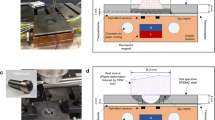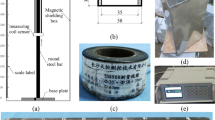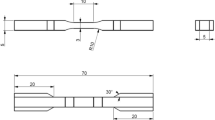Abstract
A STEEL wire was suspended in a solenoid which was excited by direct current. Embracing the wire at the central part of the solenoid was a search coil of 4,000 turns in circuit with a ballistic galvanometer of long period of swing. When a load was applied to the wire a throw of the galvanometer was obtained and the magnitude of the change of flux linkages corresponding to this throw was found to be related to the magnetising force of the solenoid by a curve such as that shown in Fig. 1. It will be seen that this curve passes through a maximum value and also that there are two values of the magnetising force for which the change of flux linkages is zero. For each value of the applied load, a curve such as that shown in Fig. 1 was obtained.
This is a preview of subscription content, access via your institution
Access options
Subscribe to this journal
Receive 51 print issues and online access
$199.00 per year
only $3.90 per issue
Buy this article
- Purchase on Springer Link
- Instant access to full article PDF
Prices may be subject to local taxes which are calculated during checkout
Similar content being viewed by others
Author information
Authors and Affiliations
Rights and permissions
About this article
Cite this article
WALL, T. Application of Magneto-Striction Effect to the Observation of Work-Hardening of Steel Wires. Nature 132, 513–514 (1933). https://doi.org/10.1038/132513b0
Issue Date:
DOI: https://doi.org/10.1038/132513b0
Comments
By submitting a comment you agree to abide by our Terms and Community Guidelines. If you find something abusive or that does not comply with our terms or guidelines please flag it as inappropriate.



